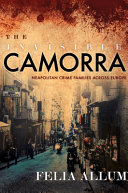

Most ebook files are in PDF format, so you can easily read them using various software such as Foxit Reader or directly on the Google Chrome browser.
Some ebook files are released by publishers in other formats such as .awz, .mobi, .epub, .fb2, etc. You may need to install specific software to read these formats on mobile/PC, such as Calibre.
Please read the tutorial at this link: https://ebookbell.com/faq
We offer FREE conversion to the popular formats you request; however, this may take some time. Therefore, right after payment, please email us, and we will try to provide the service as quickly as possible.
For some exceptional file formats or broken links (if any), please refrain from opening any disputes. Instead, email us first, and we will try to assist within a maximum of 6 hours.
EbookBell Team

0.0
0 reviewsThe organized crime group that dominates much of the socioeconomic life of contemporary Naples, the Camorra, is organized by kin and geography, and it is notoriously the most violent, fractious, and disorganized mafia in Italy. The Camorra controls local extortion rackets, the drug and counterfeit trades, and other legal and illicit activities as well as wielding substantial political influence throughout Naples and its environs. Felia Allum has been researching the Camorra for twenty years, and in The Invisible Camorra she reveals a surprising alteration in Camorra behavior when operatives live outside the Neapolitan base. When gang members move away from Naples, having been forced out by intense policing and gang competition, they are attracted by business opportunities that, on the whole, fit in with their usual activities. When they move to other parts of Western Europe and are therefore no longer criminals simply by virtue of "mafia association" as they are in Italy, they become largely invisible. Gang members avoid the spectacular deployment of violence, they merge quietly into local life, they keep themselves to themselves, and, when necessary, use legitimate local actors such as lawyers and accountants to further their economic well-being.
Allum has constructed a meticulous description and analysis of Camorra activities abroad. To build accounts of the Camorra in Germany and the Netherlands, France, Spain, and the United Kingdom, she has interviewed investigating magistrates, police officers, and confessed criminals; done substantial mining of Italian and European police data; and made extensive use of judicial investigations, court records and transcripts as well as of journalistic accounts. The result is the first systematic analysis of the overseas activities of this major criminal organization.